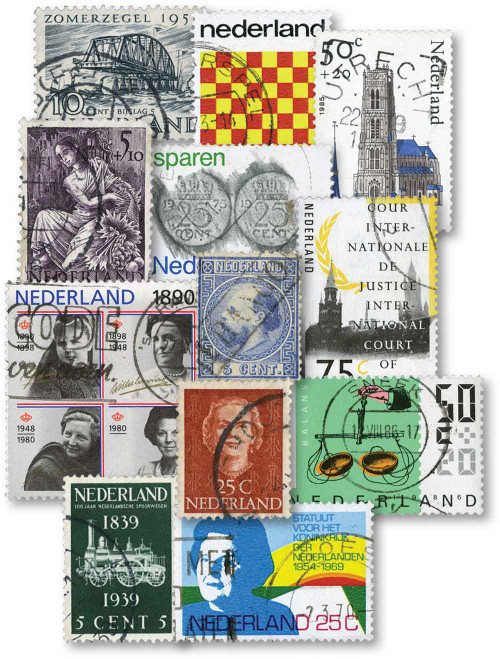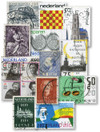
# MP1693 - Netherlands Pictorials, 500 Different Stamps
Discover Netherlands History & Culture
On 500 Netherlands Pictorials
“God Created the World... But the Dutch Created Holland!” This is a popular saying among many Dutch people. At one time, the sea covered more than forty percent of Netherlands. Over the years, industrious Dutch citizens have built dikes around small areas and pumped the water out. These drained areas, called polders, are home to some of the richest and most densely populated regions in the country. Amsterdam, the capital city of Netherlands, is built on a polder! Because they’ve had to work so hard for their land, the Dutch people are very proud of their national heritage. This pride shows on their stamps. Add some to your collection today.
More About the Netherlands…
Although the Kingdom of the Netherlands is most commonly known as Holland, natives prefer to be called either Netherlanders or Dutchmen. The Netherlands, which enjoys the oldest unbroken diplomatic relations with the United States in our history, is located on the North Sea, just above Belgium and France. About the size of Massachusetts and Connecticut combined, most of the Netherlands is flat ground that lies below sea level. The low, flat terrain makes the Netherlands great for farming. Dutch farmers export their cheeses and flowers all over the world.
Since most land is below sea level, many of the Netherlands’ lakes and rivers have been drained for housing and farming. The Netherlanders have also built many dikes to hold water back from low-lying land. Because they have had to do so much to get enough usable land, the Dutch have a saying, “God made the Earth, but the Dutch made Holland.”
Most Dutchmen speak Dutch, which is a Germanic language. But like most Europeans, they can also speak other languages such as English and French. The Dutch are active people. They like music, drama, and art. Popular sports activities include sailing and ice-skating. Every Dutch roadway has wide bicycle lanes, perfect for bicycling and walking. The average family has at least four bicycles. In spring and summer, the days are so long that well after ten o’clock in the evening, travelers see no sunset. The vast expanse of flat land stretches out in all directions, and the only thing that stands out on the horizon is the occasional windmill. Windmills used to pump water out of the land, but now they are simply part of the scenery, because today water is pumped by modern electrical power stations.
Although bicycling is a popular way to travel, Netherlanders also have one of the best public transit systems in the world. The system, which includes buses, streetcars and trains, makes it easy to travel around the Netherlands, as well as other countries. For example, a train bound for France leaves the station in Amsterdam every ten minutes.
Visitors can take any one of the canal boat tours in the Netherlands’ three main cities of Amsterdam, Rotterdam, and the Hague. On the tour, they get a glimpse of the unique homes that line the city waterways. One also passes by many canal boats that some Netherlanders live on year round, even in the city.
Discover Netherlands History & Culture
On 500 Netherlands Pictorials
“God Created the World... But the Dutch Created Holland!” This is a popular saying among many Dutch people. At one time, the sea covered more than forty percent of Netherlands. Over the years, industrious Dutch citizens have built dikes around small areas and pumped the water out. These drained areas, called polders, are home to some of the richest and most densely populated regions in the country. Amsterdam, the capital city of Netherlands, is built on a polder! Because they’ve had to work so hard for their land, the Dutch people are very proud of their national heritage. This pride shows on their stamps. Add some to your collection today.
More About the Netherlands…
Although the Kingdom of the Netherlands is most commonly known as Holland, natives prefer to be called either Netherlanders or Dutchmen. The Netherlands, which enjoys the oldest unbroken diplomatic relations with the United States in our history, is located on the North Sea, just above Belgium and France. About the size of Massachusetts and Connecticut combined, most of the Netherlands is flat ground that lies below sea level. The low, flat terrain makes the Netherlands great for farming. Dutch farmers export their cheeses and flowers all over the world.
Since most land is below sea level, many of the Netherlands’ lakes and rivers have been drained for housing and farming. The Netherlanders have also built many dikes to hold water back from low-lying land. Because they have had to do so much to get enough usable land, the Dutch have a saying, “God made the Earth, but the Dutch made Holland.”
Most Dutchmen speak Dutch, which is a Germanic language. But like most Europeans, they can also speak other languages such as English and French. The Dutch are active people. They like music, drama, and art. Popular sports activities include sailing and ice-skating. Every Dutch roadway has wide bicycle lanes, perfect for bicycling and walking. The average family has at least four bicycles. In spring and summer, the days are so long that well after ten o’clock in the evening, travelers see no sunset. The vast expanse of flat land stretches out in all directions, and the only thing that stands out on the horizon is the occasional windmill. Windmills used to pump water out of the land, but now they are simply part of the scenery, because today water is pumped by modern electrical power stations.
Although bicycling is a popular way to travel, Netherlanders also have one of the best public transit systems in the world. The system, which includes buses, streetcars and trains, makes it easy to travel around the Netherlands, as well as other countries. For example, a train bound for France leaves the station in Amsterdam every ten minutes.
Visitors can take any one of the canal boat tours in the Netherlands’ three main cities of Amsterdam, Rotterdam, and the Hague. On the tour, they get a glimpse of the unique homes that line the city waterways. One also passes by many canal boats that some Netherlanders live on year round, even in the city.











